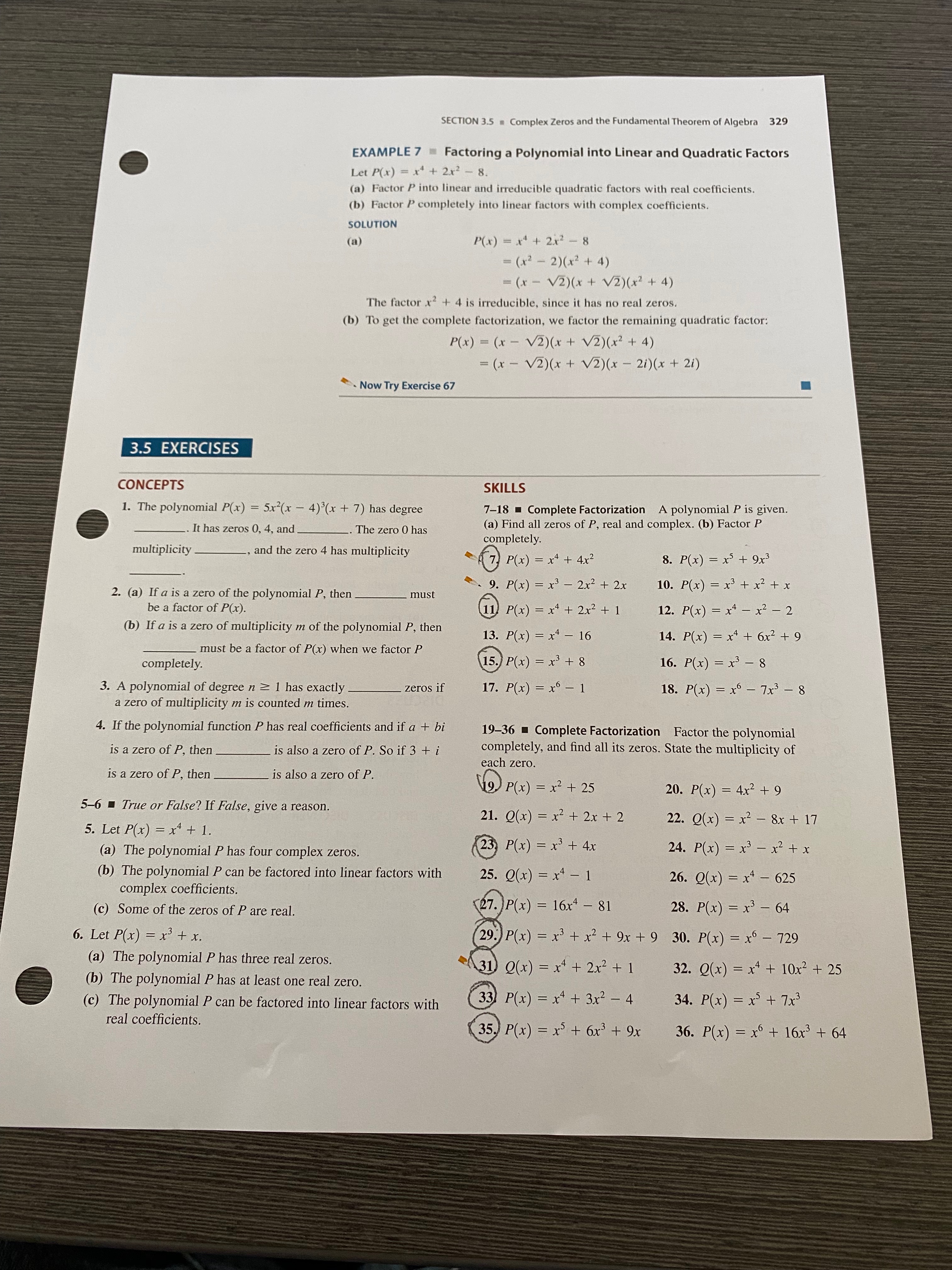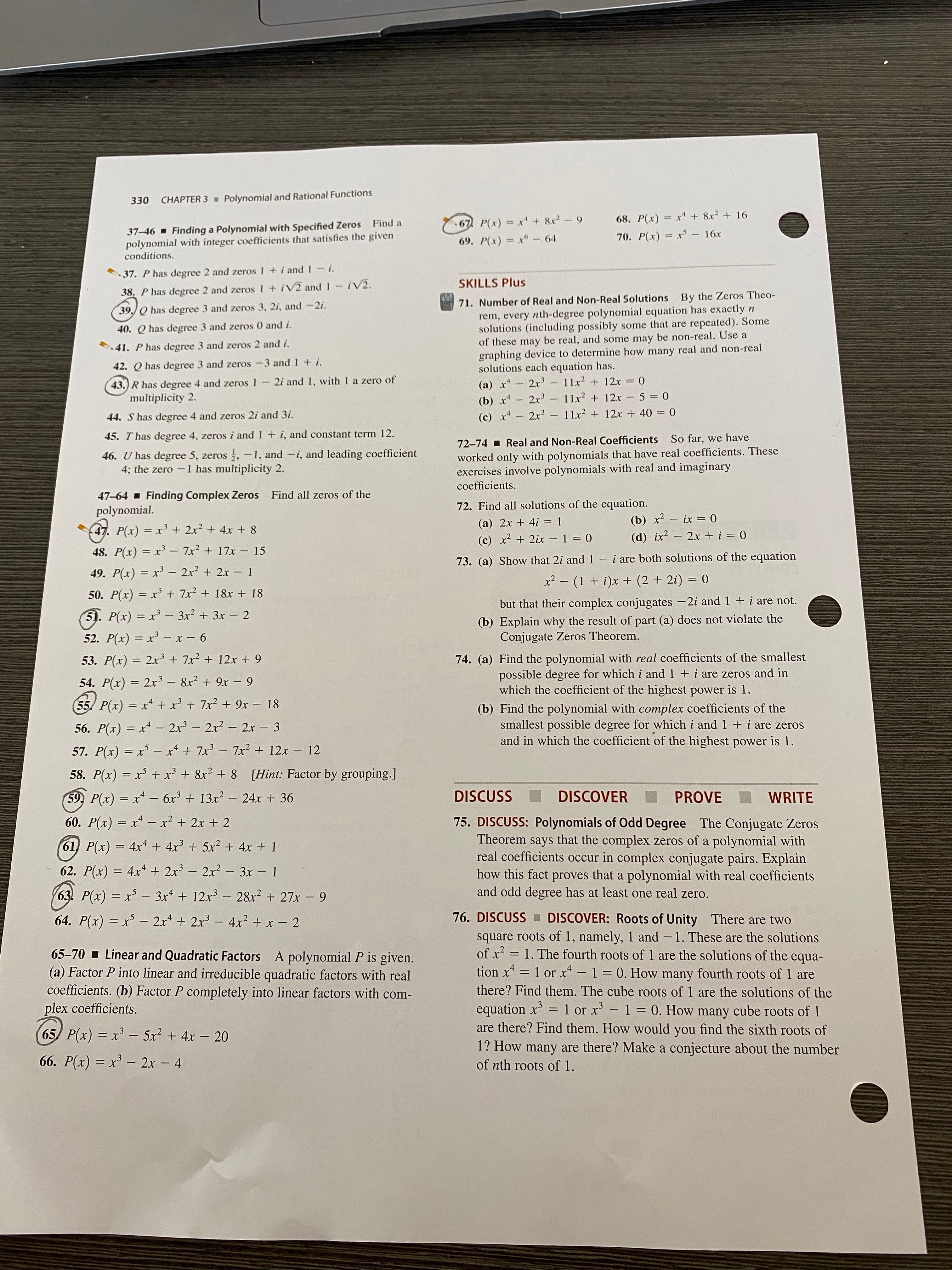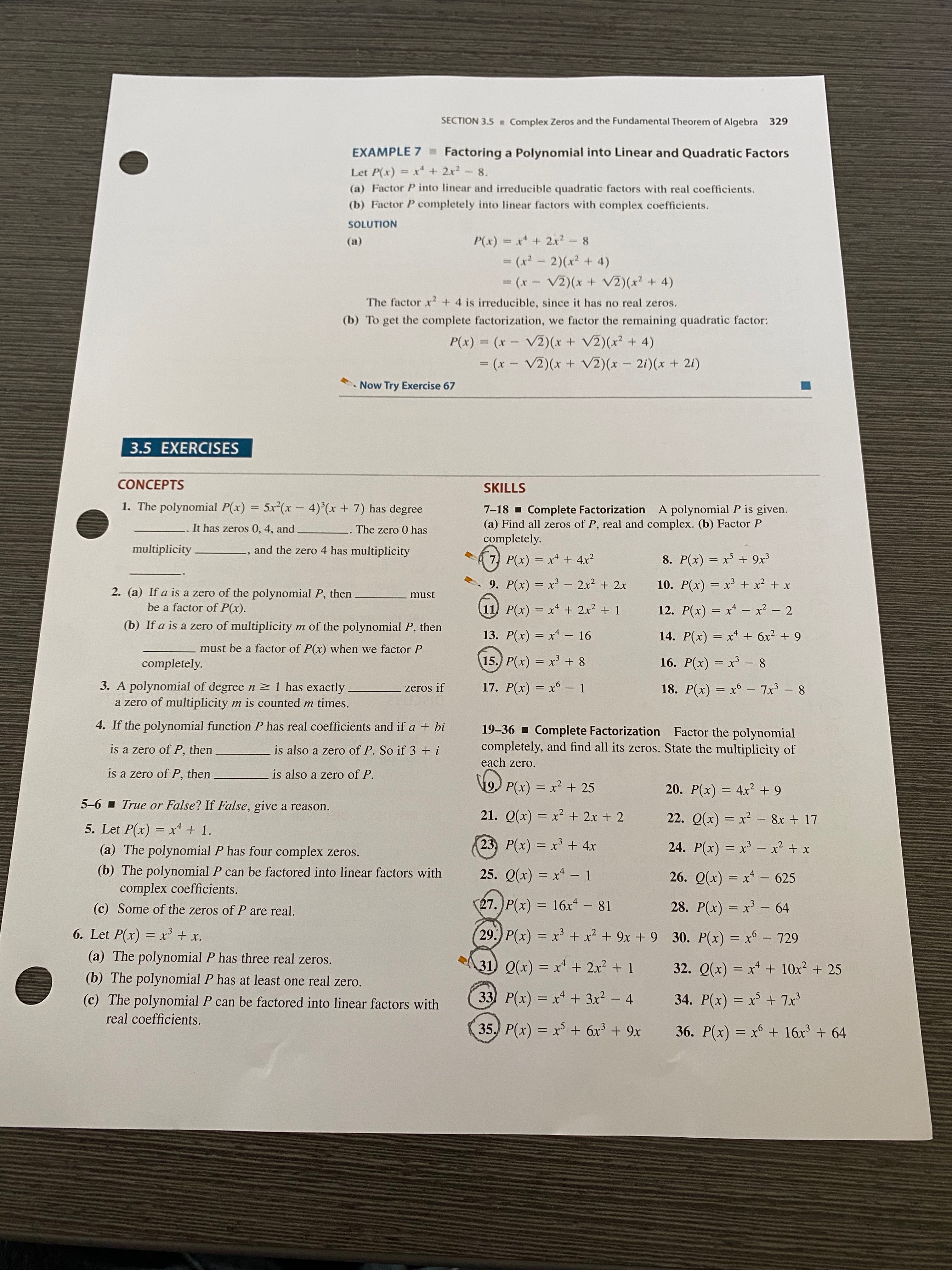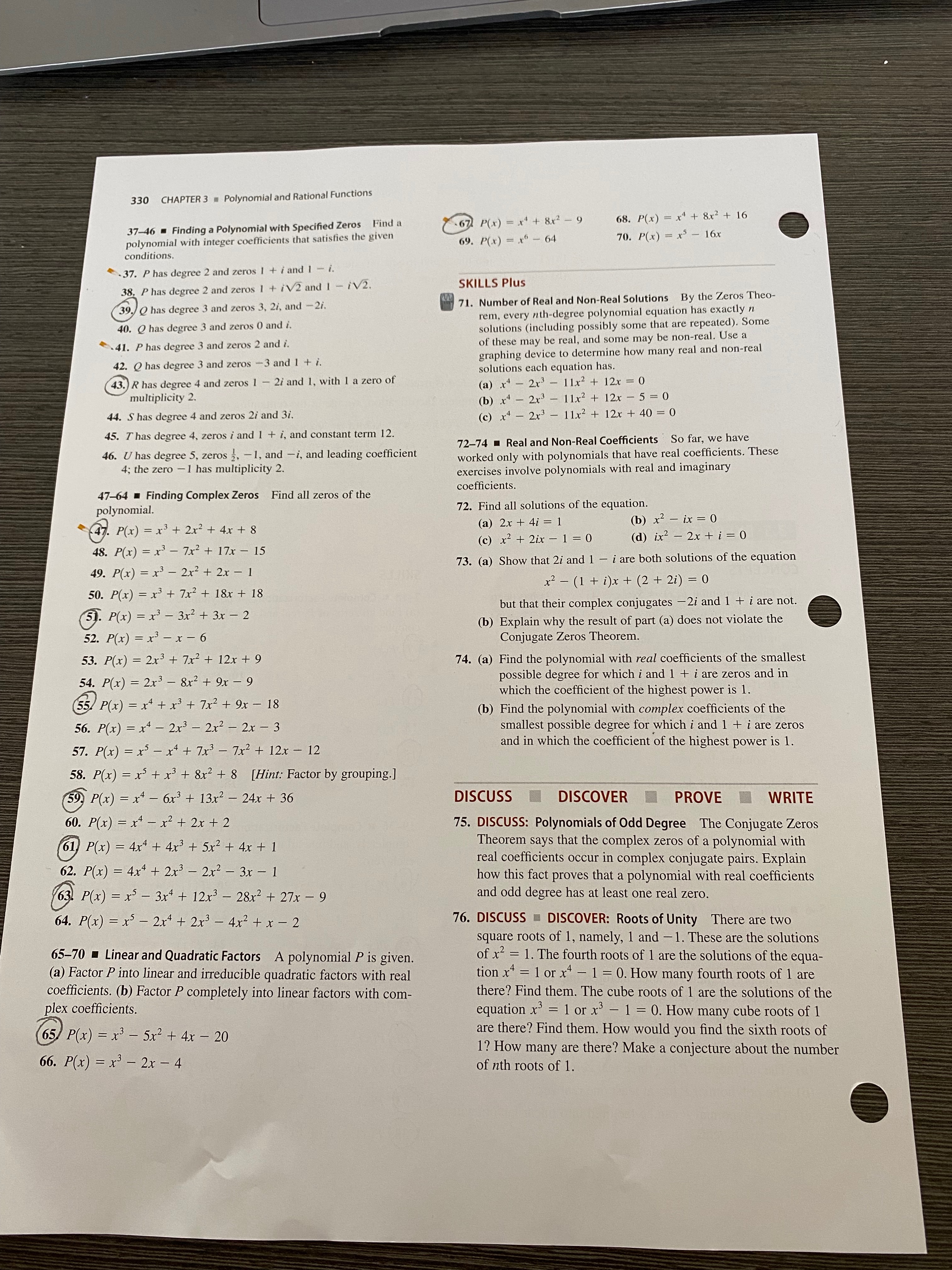Question: 7-67 (Every fourth, and also 29, 33, 61, 65; pp.329-330 ) SECTION 3.5 . Complex Zeros and the Fundamental Theorem of Algebra 329 EXAMPLE 7


7-67 (Every fourth, and also 29, 33, 61, 65;pp.329-330)


SECTION 3.5 . Complex Zeros and the Fundamental Theorem of Algebra 329 EXAMPLE 7 . Factoring a Polynomial into Linear and Quadratic Factors Let P(x ) = *4+ 2x2 - 8. (a) Factor P into linear and irreducible quadratic factors with real coefficients. (b) Factor P completely into linear factors with complex coefficients. SOLUTION (a) P(x) = 14+ 212 - 8 = (12 - 2)(x2 + 4) = (x - V2)(x + V2)(x2 + 4) The factor x2 + 4 is irreducible, since it has no real zeros. (b) To get the complete factorization, we factor the remaining quadratic factor: P(x) = (x - V2)(x + V2) (x2 + 4) = (x - V2)(x+ V2)(x - 21)(x+ 21) Now Try Exercise 67 3.5 EXERCISES CONCEPTS SKILLS 1. The polynomial P(x) = 5x (x - 4)3(x + 7) has degree 7-18 - Complete Factorization A polynomial P is given. It has zeros 0, 4, and The zero 0 has (a) Find all zeros of P, real and complex. (b) Factor P completely. multiplicity , and the zero 4 has multiplicity ( 7 P ( x ) = 1 4 + 4x 2 8. P(x) = x5 +9x3 . 9. P(x) = x3 - 2x2 + 2x 10. P(x) = x3 + x2 + x 2. (a) If a is a zero of the polynomial P, then must be a factor of P(x). 11 P ( x ) = * 4 + 2 x 2 + 1 12 . P (x ) = x4 - x2 - 2 (b) If a is a zero of multiplicity m of the polynomial P, then 13. P(x ) = x4 - 16 14. P(x) = x4 + 6x2 + 9 must be a factor of P(x) when we factor P completely. 15 . ) P ( x ) = x 3 + 8 16. P(x) = x3 - 8 3. A polynomial of degree n 2 1 has exactly - zeros if 17. P(x) = x6 - 1 18. P(x) = x6 - 7x3 - 8 a zero of multiplicity m is counted m times. 4. If the polynomial function P has real coefficients and if a + bi 19-36 - Complete Factorization Factor the polynomial is a zero of P, then is also a zero of P. So if 3 + i completely, and find all its zeros. State the multiplicity of each zero. is a zero of P, then is also a zero of P. Vo P ( x ) = x 2 + 25 20. P(x) = 4x2 + 9 5-6 5 True or False? If False, give a reason. 21. @(x) = x2 + 2x + 2 22. Q(x) = x2 - 8x + 17 5. Let P(x) = x4+ 1. (a) The polynomial P has four complex zeros. 23, P ( x ) = x3 + 4x 24. P(x ) = x3 - x2+ x (b) The polynomial P can be factored into linear factors with 25. Q(x) = x4 - 1 26. Q(x) = x4 -625 complex coefficients. (c) Some of the zeros of P are real. ( 27 . ) P ( x ) = 16x 4 - 81 28. P(x) = x3 - 64 6. Let P(x) = x3 + x. (29.) P(x) = x3 + x2 + 9x + 9 30. P(x) =x6-729 (a) The polynomial P has three real zeros. (31) Q(x) = x4+ 2x2 + 1 32. Q(x) = x4+ 10x2 + 25 (b) The polynomial P has at least one real zero. (c) The polynomial P can be factored into linear factors with 33 P ( x ) = *4 + 3x 2 - 4 34. P(x ) = x5 + 7x3 real coefficients. 35. P(x ) = x5+ 6x3 + 9x 36. P(x) = x + 16x3 + 64330 CHAPTER 3 . Polynomial and Rational Functions 37-46 - Finding a Polynomial with Specified Zeros Find a (67) P(x ) = 14+ 8.12 -9 68. P(x) = x4 + 8x2 + 16 polynomial with integer coefficients that satisfies the given 69. P(x) = 16 - 64 70. P(x) = x5 - 16x conditions. .37. P has degree 2 and zeros 1 + i and 1 - i. 38. P has degree 2 and zeros 1 + iV2 and 1 - iV2. SKILLS Plus 39. @ has degree 3 and zeros 3, 2i, and - 2i. 71. Number of Real and Non-Real Solutions By the Zeros Theo- rem, every nth-degree polynomial equation has exactly n 40. @ has degree 3 and zeros 0 and i. solutions (including possibly some that are repeated). Some 41. P has degree 3 and zeros 2 and i. of these may be real, and some may be non-real. Use a 42. @ has degree 3 and zeros -3 and 1 + i. graphing device to determine how many real and non-real solutions each equation has. 43.) R has degree 4 and zeros 1 - 2i and 1, with 1 a zero of (a) x4 - 2x3 - 11x2 + 12x = 0 multiplicity 2. (b) x4 - 2x3 - 11x2 + 12x - 5 =0 44. S has degree 4 and zeros 2i and 3i. (c) x4 - 2x3 - 11x2 + 12x + 40= 0 45. T has degree 4, zeros i and 1 + i, and constant term 12. 72-74 Real and Non-Real Coefficients So far, we have 46. U has degree 5, zeros 2, -1, and -i, and leading coefficient worked only with polynomials that have real coefficients. These 4; the zero - 1 has multiplicity 2. exercises involve polynomials with real and imaginary 47-64 - Finding Complex Zeros Find all zeros of the coefficients. polynomial. 72. Find all solutions of the equation. (47. P(x ) = x3+ 2x2 + 4x+ 8 (a) 2x + 4i = 1 (b) x2 - ix = 0 48. P( x ) = x3 - 7x2 + 17x - 15 (c) x2 + 2ix - 1 = 0 (d) ix' - 2x + i = 0 49. P(x) = x3 - 2x2 + 2x - 1 73. (a) Show that 2i and 1 - i are both solutions of the equation 50. P(x ) = x3 + 7x2 + 18x + 18 12 - ( 1 + i ) x + (2 + 2i) = 0 5). P(x) = x3 - 3x2 + 3x - 2 but that their complex conjugates -2i and 1 + i are not (b) Explain why the result of part (a) does not violate the 52 . P(x ) = x3 - x- 6 Conjugate Zeros Theorem. 53. P(x ) = 2x3 + 7x2 + 12x + 9 74. (a) Find the polynomial with real coefficients of the smallest 54. P(x) = 2x3 - 8x2 + 9x - 9 possible degree for which i and 1 + i are zeros and in 55 P(x) = x4+x3+ 7x2 + 9x - 18 which the coefficient of the highest power is 1. (b) Find the polynomial with complex coefficients of the 56. P ( x) = x4 - 2x3 - 2x2 - 2x - 3 smallest possible degree for which i and 1 + i are zeros 57 . P(x ) = x5 - x4+ 7x3 - 7x2 + 12x - 12 and in which the coefficient of the highest power is 1. 58. P(x) = x5 + x' + 8x2 + 8 [Hint: Factor by grouping.] (59, P(x) = x4 - 6x3 + 13x2 - 24x + 36 DISCUSS DISCOVER PROVE WRITE 60. P(x) = x4 - x2+ 2x+ 2 75. DISCUSS: Polynomials of Odd Degree The Conjugate Zeros 61 P(x) = 4x4 + 4x3 + 5x2 + 4x + 1 Theorem says that the complex zeros of a polynomial with $2. P(x) = 4x4 + 2x3 - 2x2 - 3x - 1 real coefficients occur in complex conjugate pairs. Explain how this fact proves that a polynomial with real coefficients 63. P(x) = x5 - 3x4 + 12x3 - 28x2 + 27x -9 and odd degree has at least one real zero. 64. P(x) = x5 - 2x4 + 2x3 - 4x2 + x- 2 76. DISCUSS . DISCOVER: Roots of Unity There are two square roots of 1, namely, 1 and - 1. These are the solutions 65-70 - Linear and Quadratic Factors A polynomial P is given. of x2 = 1. The fourth roots of 1 are the solutions of the equa- (a) Factor P into linear and irreducible quadratic factors with real tion x* = 1 or x* - 1 = 0. How many fourth roots of 1 are coefficients. (b) Factor P completely into linear factors with com- there? Find them. The cube roots of 1 are the solutions of the plex coefficients. equation x' = 1 or x' - 1 = 0. How many cube roots of 1 65 P(x ) = x3 - 5x2 +4x - 20 are there? Find them. How would you find the sixth roots of 66. P(x) = x3 - 2x - 4 1? How many are there? Make a conjecture about the number of nth roots of 1
Step by Step Solution
There are 3 Steps involved in it

Get step-by-step solutions from verified subject matter experts


